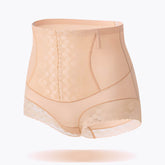Bras Are Not Responsible for Breast Cancer

Many women fear that wearing underwire bras could cause breast cancer. The belief persisted for a long time, although it was not proven. Researchers have now definitively disproved the connection.
Many rumors circulate about the development of breast cancer. One of them is that wearing underwired bra clamps off the lymphatic channels, hindering the removal of harmful cell waste and increasing the risk of cancer. This claim has never been substantiated. A study published in the American cancer journal Cancer Epidemiology, Biomarkers & Prevention now proves that there is no link between wearing bras and breast cancer.
For the study led by Lu Chen, a researcher at the Fred Hutchinson Cancer Research Center in Seattle (FHCRC), 1,500 women with and without breast cancer were asked about their bra habits. Questions included what cup size they were, how many hours a day they wore a bra, how many of their bras had underwires, and at what age they started wearing them. After evaluation, the researchers were unable to identify a link between cancer incidence and wearing habits. They weren't particularly surprised, Chen says, we knew the evidence for a link between bras and breast cancer was very thin.
Breast size is a risk
But where does the belief that intimate washing might promote breast cancer come from? According to an article published on the FHCRC website, the conspiracy finds its start in a Harvard study published in 1991. It had found that women who did not wear bras were less likely to get breast cancer than women with large cups. However, the study had significant flaws. For example, the fact that age and weight are breast cancer risks would have been severely neglected.
According to the American Cancer Society (ACS), a 1995 book with the lurid title "Dressed to Kill - The Link between Breast Cancer and Bras" further fueled the rumor. The pair of authors, Sydney Ross Singer and Soma Grismaijer, claimed that women who wear a tight bra are at over a hundred times greater risk of cancer than women who never wear a bra. The lymphatic system would be impeded by the constriction, whereupon toxins would accumulate in the breasts, the anthropologists explained. The ACS rejects the thesis as unsubstantiated. There is no published study proving that lymphatic compression leads to breast cancer, it said.
"The thesis is misleading and dangerous."
Chen also dismisses as baseless the argument that fewer breast cancer cases are counted in developing countries where women don't wear bras. It's not clothing habits that account for the higher incidence of cancer in industrialized nations, he says, but actual risk factors such as lack of exercise and obesity, as well as the fact that tumors are simply detected more frequently in more developed nations.
Ted Gansler, medical director of the ACS, praised the study. Such unsubstantiated theses are not only misleading, but they could also be dangerous, he said. Fear would be unnecessarily stoked among women who do not have a family predisposition to breast cancer, and attention diverted from real risk factors and preventive measures. Women who already have breast cancer might develop guilt from this claim. Gansler hopes the study will encourage women to ignore this breast cancer rumor once and for all and in good conscience.



























